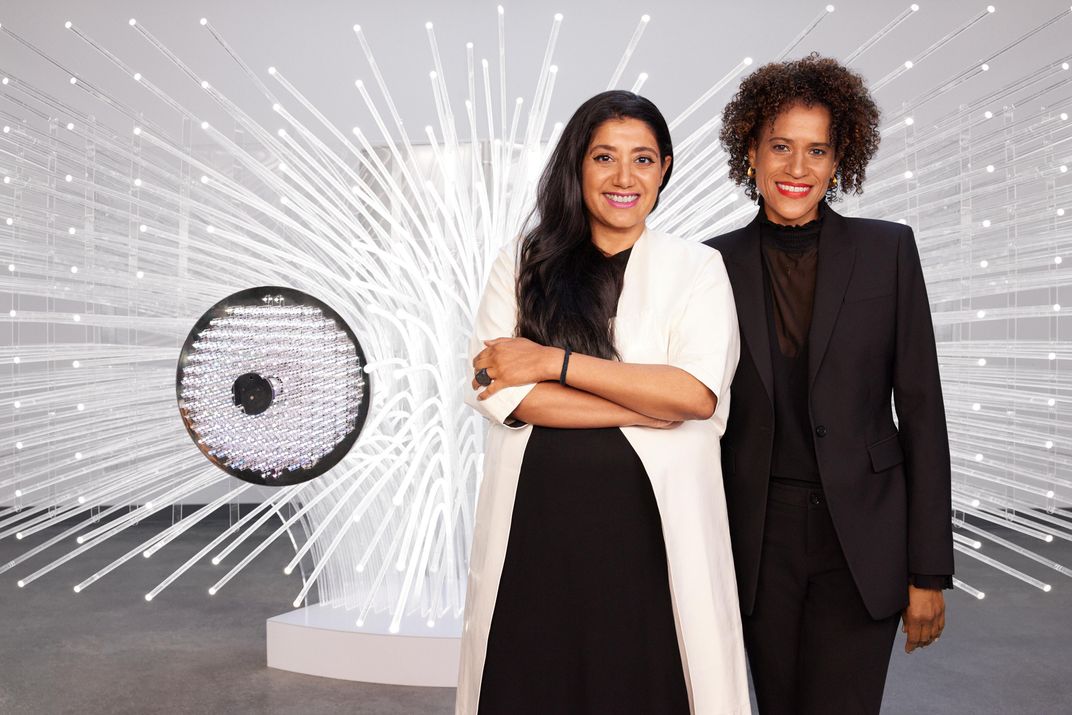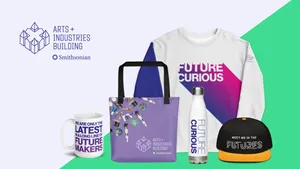A New, Interactive Sculpture by Suchi Reddy Illuminates Our Hopes and Fears About the Future
The A.I.-powered installation, a hallmark of the Smithsonian’s upcoming “Futures” show, promises something never seen or experienced before
/https://tf-cmsv2-smithsonianmag-media.s3.amazonaws.com/filer/a0/cf/a0cfaf44-1df0-4b52-80a2-48fdd8c2ae3c/v01_rev.jpg)
At the first event of the Smithsonian’s new Arts and Industries Building—the 1881 inauguration ball for the newly elected President James Garfield—the centerpiece in the rotunda was the magnificent Statue of America. In her upraised hand, she lifted not a torch, but a single, lit incandescent electric bulb.
Its illumination, “indicative of the skill, genius, progress and civilization of the 19th century,” according to a handbill at the time, not only outshone the 3,000 gas lights in the new building, but may have been the hit of the historic event, just nine months after Thomas Edison’s wildly innovative light bulb had received a patent.
“Garfield’s inauguration was the first time, as far as we can tell, that electric light was seen in Washington, D.C.,” says Rachel Goslins, the director of the Arts and Industries Building (AIB), a 19th-century, red-brick exhibition palace designed by the German-born architect Adolf Cluss. The building has been mostly closed to visitors for nearly two decades, but reopens this fall with for the dazzlingly ambitious “Futures” exhibition, a centerpiece of the Smithsonian’s 175 anniversary celebration.
Announced today, the rotunda of the old AIB building will soon dazzle again with a gleaming two-story interactive sculpture as the focal point of the new show. The renowned New York artist and architect Suchi Reddy will unveil me + you, a site-specific installation incorporating light, color and the latest in artificial intelligence analysis.

To activate the interactive piece, commissioned by Amazon Web Services, visitors will be asked to offer a spoken vision of the future through a single word. The sculpture will then analyze the input by content, tone and inflection, using AI techniques, and reflect back a singular kinetic mandala of color and light, representing each contribution before it moves, flowing through a matrix of tendrils and LED light to a central area above where it will reflect a prevailing mood. A web aspect of the piece will allow people unable to visit in person to reflect their vision, allowing for a global collection of feelings about the future.
Reddy’s me + you is the first major art commission from Amazon Web Services, which spent $1 million on the artwork’s various costs.
For Reddy, the India-born New Yorker known primarily for her architecture, the idea of toying with artificial intelligence in an art piece was fascinating. “It’s such a big part of our lives that we have rather invisibly melded with, without careful consideration,” Reddy says. “I felt like it would be such a wonderful opportunity to really think that through extremely carefully.”
Then she found out where it was going to be displayed. “The fact that it was going to be on the spot where Edison first displayed his light bulb—I mean, no pressure!”
Reddy says she considered different ways to represent artificial intelligence. “But it was very clear to me from the beginning that it had to be about light.”
But as she noted, the 90-foot-high central rotunda of the second oldest Smithsonian building on the National Mall, is bathed in light from skylights and clerestory windows.
“It was already this sublime space, and I felt like whatever it was had to speak to that level of sublimity,” Reddy says.
The tendrils emanating from the piece in light—in LED, not the incandescent bulb Edison made—and the various microphones—adjusted to reach tall and short, old and young, and accessible for those in wheelchairs—will reach out to the public to gauge their thoughts about what’s to come.
“Everybody is thinking about the future, wondering about the future, some people may even be fearful of the future, not knowing what that looks like,” says project curator Isolde Brielmaier. “This is an opportunity for people to pause, consider, and think, and reflect, and then call it out.”
Brielmaier, who is also a professor of critical studies in New York University’s Tisch Department of Photography, Imaging and Emerging Media, says the “artwork can’t exist without people, the engagement of people, but neither can our future. It’s really all the individuals coming forward to forge a collective future.”
A crew of AWS engineers worked closely with Reddy’s team for over two years. investing more than 1,200 hours to create its cloud technology infrastructure. “I’ve learned a lot of new languages,” Reddy says.
“We are grateful for this opportunity to show Smithsonian visitors and online viewers just how beautiful technology can be,” says Swami Sivasubramanian vice president of Amazon Machine Learning at AWS. “Reddy’s vision and artistry, combined with AWS technology, has created an awe-inspiring work of art sure to leave a lasting impression on anyone who engages with it.”
The “Futures” exhibition will feature more than 150 objects, ideas prototypes and installations, fusing art, technology design and history. It will look at climate solutions and show flying cars, floating cities and wearable technology. But it will also feature futuristic-thinking artifacts from Alexander Graham Bell’s experimental phone to NASA’s spacesuit testing android.
For the centerpiece of “Futures,” Goslins says, “We always knew we wanted something big and marvelous in the rotunda. The rotunda has always been the beating heart of the Arts and Industries Building. It has been filled at different times with many things—some of our most exciting things.” That included a fully inflated hot air balloon and a rock from the surface of the moon just two months after astronauts first landed there.
“It’s always been the place at the Smithsonian where we’ve debuted our most exciting objects, our biggest ideas, the things that were about to change the world—the electric light bulb to the telegraph to the steam locomotive to the Spirit of Saint Louis to the Apollo 11 capsule. For 140-plus years, it was the place where most people first encountered these objects, but also these ideas that were going to transform the way we were going to live,” she says. “The rotunda has a great history of being the epicenter of our big ideas and our showiest, most exciting content. And me + you absolutely follows that path.”
Goslins says they always wanted “something that amplified all of our highest-level themes of connection and interplay between humanity and technology and hopefulness for the future.”
“I wanted to represent and encapsulate the biggest and most important themes of our exhibition. And then at a physical level, I wanted it to be spectacular. I wanted it to be shimmering and monumental, and playful. And I wanted it to be the thing that when you walk into the building your eye is drawn towards and you want to say ‘What is that?’ and go towards it.”
Suchi Reddy’s me + you will be part of the “Futures” exhibition at the Smithsonian Arts and Industries Building from November 2021 to July 2022.
/https://tf-cmsv2-smithsonianmag-media.s3.amazonaws.com/accounts/headshot/RogerCatlin_thumbnail.png)

/https://tf-cmsv2-smithsonianmag-media.s3.amazonaws.com/accounts/headshot/RogerCatlin_thumbnail.png)